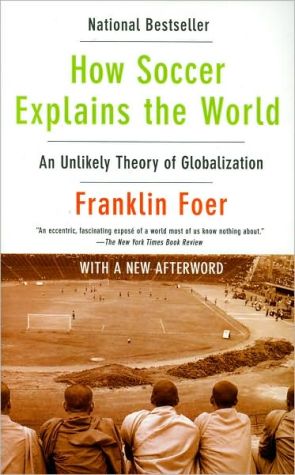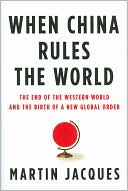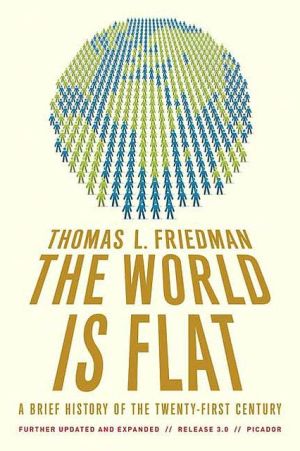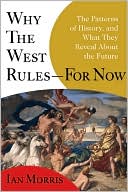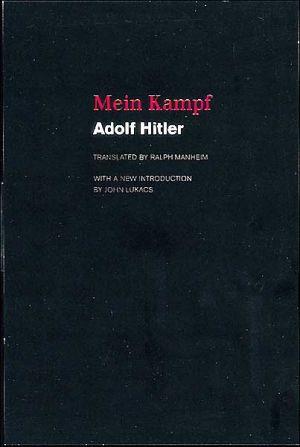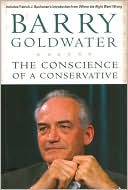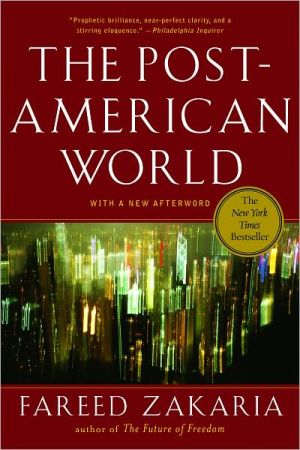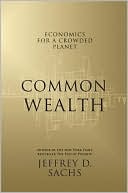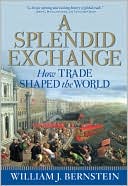How Soccer Explains the World: An Unlikely Theory of Globalization
Soccer is much more than a game, or even a way of life. It's a perfect window into the crosscurrents of today's world, with all its joys and sorrows. In this remarkably insightful, wide-ranging work of reportage, Franklin Foer takes us on a surprising tour through the world of soccer, shining a spotlight on the clash of civilizations, the international economy, and just about everything in between. How Soccer Explains the World is an utterly original book that makes sense of our troubled times.
Search in google:
Soccer is much more than a game, or even a way of life. It's a perfect window into the crosscurrents of today's world, with all its joys and sorrows. In this remarkably insightful, wide-ranging work of reportage, Franklin Foer takes us on a surprising tour through the world of soccer, shining a spotlight on the clash of civilizations, the international economy, and just about everything in between. How Soccer Explains the World is an utterly original book that makes sense of our troubled times. Publishers Weekly Foer, a New Republic editor, scores a game-winning goal with this analysis of the interchange between soccer and the new global economy. The subtitle is a bit misleading, though: he doesn't really use soccer to develop a theory; instead, he focuses on how examining soccer in different countries allows us to understand how international forces affect politics and life around the globe. The book is full of colorful reporting, strong characters and insightful analysis: In one of the most compelling chapters, Foer shows how a soccer thug in Serbia helped to organize troops who committed atrocities in the Balkan War-by the end of the war, the thug's men, with the acquiescence of Serbian leaders, had killed at least 2,000 Croats and Bosnians. Then he bought his own soccer club and, before he was gunned down in 2000, intimidated other teams into losing. Most of the stories aren't as gruesome, but they're equally fascinating. The crude hatred, racism and anti-Semitism on display in many soccer stadiums is simply amazing, and Foer offers context for them, including how current economic conditions are affecting these manifestations. In Scotland, the management of some teams have kept religious hatreds alive in order to sell tickets and team merchandise. But Foer, a diehard soccer enthusiast, is no anti-globalist. In Iran, for example, he depicts how soccer works as a modernizing force: thousands of women forced police to allow them into a men's-only stadium to celebrate the national team's triumph in an international match. One doesn't have to be a soccer fan to truly appreciate this absorbing book. (July) Copyright 2004 Reed Business Information.
How Soccer Explains the World\ An Unlikely Theory of Globalization \ \ By Foer, Franklin \ HarperCollins Publishers\ ISBN: 0066212340 \ \ \ Chapter One\ How Soccer Explains\ the Gangster's Paradise\ Red Star Belgrade is the most beloved, most successful soccer team in Serbia. Like nearly every club in Europe and Latin America, it has a following of unruly fans capable of terrific violence. But at Red Star the violent fans occupy a place of honor, and more than that. They meet with club officials to streamline the organizational flow chart of their gangs. Their leaders receive stipends. And as part of this package, they have access to office space in the team's headquarters in the uppermiddle- class neighborhood of Topcider.\ The gangs have influence, in large measure, because they've won it with intimidation. A few months before I arrived in Belgrade to learn about the club's complicity in the Balkan Wars of the 1990s, Red Star fan clubs had burst into the team's training session. With bats, bars, and other bludgeons, they beat three of their own players. After their havoc, they aren't typically shy about advertising their accomplishments. In this instance, the hooligans told reporters bluntly that they could "no longer tolerate lack of commitment on the pitch." It took only one phone call to organize an interview with a handful of them in their first-floor meeting room at the Red Star headquarters.\ The Belgrade neighborhood around Red Star is cartoonishly ominous. An enormous gaggle of crows resides on the stadium's roof. When goals are scored and the crowd erupts, the birds flee -- across town, it's possible to gauge the results of a game based on presence or absence of an ornithological cloud above the skyline. On the other side of the street from the stadium, the family of Arkan, the most notorious warlord and gangster in Serb history, lives in a castle he constructed, a nouveau riche monstrosity with tiers of towers and turrets. When I loiter near the house for too long, a large man in a leather jacket emerges and inquires about my business. Because of the atrocities committed by Arkan's men, I describe myself as a lost tourist, nervously ask him for directions, and walk away briskly. On the evening of my visit, the sky is gunmetal.\ My translator had arranged for me to meet with Draza, a leader of a Red Star fan club that calls itself the Ultra Bad Boys. He had persuaded him with the overblown promise that an interview would bring glory unto the club and world renown unto the achievements of the Red Star fans. Six of Draza's loquacious colleagues join him. At first glance, the Bad Boys look entirely unworthy of the first part of their name and too worthy of the second. Aside from the big red tattoos of their gang name on their calves, they seem like relatively upstanding young men. Draza wears a fleece jacket and chinos. His head of overgrown yet obviously manicured hair has the aura of a freshman philosophy student. As it turns out, he is a college student, swamped with preparations for exams. His comrades aren't any more menacing. One of them has a bowl haircut, a pudgy face, and an oversized ski parka that he never removes -- he looks like the kind of guy who's been shoved into his fair share of lockers.\ Perhaps to increase their credibility, the Bad Boys have brought along a gray-haired man called Krle, who wears a ratty black San Antonio Spurs jacket. Krle's sinewy frame gives the impression that he fills his leisure time with pull-ups on a door frame in his flat. Many years of living a hooligan life have aged him prematurely. (When I ask his age and occupation, he changes the subject.) Unlike the naïve enthusiasm exhibited by the teens, who greet me warmly, Krle blares indifference. He tells my translator that he has only joined our interview because Draza insisted. His one gesture of bonhomie is to continually pour me warm Serbian beer from a plastic bottle. After I taste the beer, it hardly seems like such a friendly gesture. But because of his angry gray eyes, I find myself drinking glass after glass.\ Krle serves as senior advisor to the group, a mentor to the aspiring hooligans. Putting aside his intense glare and unfriendly demeanor, I was actually glad for his presence. My interest in Red Star centers on the 1990s, his heyday as thug, when the fan clubs played a pivotal role in the revival of Serbian nationalism -- the idea that the Serbs are eternal victims of history who must fight to preserve a shred of their dignity. With little prodding, Draza speaks openly about the connections. Unfortunately, his monologue doesn't last long. Exerting his authority with volatile glances and brusque interruptions, Krle seizes control of the conversation. He answers questions curtly.\ "Who do you hate most?"\ A pause for a few seconds' worth of consideration. "A Croatian, a cop: it doesn't make a difference. I'd kill them all."\ "What's your preferred method for beating a guy?"\ "Metal bars, a special kick that breaks a leg, when a guy's not noticing." He sharply stomps down a leg, an obviously well-practiced move.\ Because the beer has kicked in, I try to get closer to the reason for my visit. "I noticed that you call Arkan 'commandant.' Could you tell me a little more about how he organized the fans?"\ His look is one of deep offense and then unmitigated fury. Even before the translation comes, his meaning is clear. "I shouldn't be answering your questions. You're an American. And your country bombed us. You killed good Serb men."\ As good a reason as any to redirect the conversation to another topic. In an aside to my translator, which he didn't tell me about until after our interview, Krle announces, "If I met this American asshole on the street, I'd beat the shit out of him." Krle then drops out of the conversation. At first, he stands impatiently on the far side of the room ...\ Continues... \ \ \ \ Excerpted from How Soccer Explains the World by Foer, Franklin Excerpted by permission.\ All rights reserved. No part of this excerpt may be reproduced or reprinted without permission in writing from the publisher.\ Excerpts are provided by Dial-A-Book Inc. solely for the personal use of visitors to this web site. \ \
Prologue 11 How Soccer Explains: the Gangster's Paradise 72 How Soccer Explains: the Pornography of Sects 353 How Soccer Explains: the Jewish Question 654 How Soccer Explains: the Sentimental Hooligan 895 How Soccer Explains: the Survival of the Top Hats 1156 How Soccer Explains: the Black Carpathians 1417 How Soccer Explains: the New Oligarchs 1678 How Soccer Explains: the Discreet Charm of Bourgeois Nationalism 1939 How Soccer Explains: Islam's Hope 21710 How Soccer Explains: the American Culture Wars 235Afterword: How to Win the World Cup 249Note on Sources 259Acknowledgments 263Index 267
\ From Barnes & NobleMost journalists researching globalization spend their time at posh international conferences; the New Republic's Frank Foer does his legwork in working class bars and soccer stadiums. This hands-on journalist argues that soccer can be viewed as a lens into the new global age, exposing societal fault lines in nations from Brazil to Bosnia, from Ireland to Iran. Many of Foer's conclusions are counterintuitive: He claims, for example, that globalization has revived tribalism and entrenched corruption.\ \ \ \ \ Publishers WeeklyFoer, a New Republic editor, scores a game-winning goal with this analysis of the interchange between soccer and the new global economy. The subtitle is a bit misleading, though: he doesn't really use soccer to develop a theory; instead, he focuses on how examining soccer in different countries allows us to understand how international forces affect politics and life around the globe. The book is full of colorful reporting, strong characters and insightful analysis: In one of the most compelling chapters, Foer shows how a soccer thug in Serbia helped to organize troops who committed atrocities in the Balkan War-by the end of the war, the thug's men, with the acquiescence of Serbian leaders, had killed at least 2,000 Croats and Bosnians. Then he bought his own soccer club and, before he was gunned down in 2000, intimidated other teams into losing. Most of the stories aren't as gruesome, but they're equally fascinating. The crude hatred, racism and anti-Semitism on display in many soccer stadiums is simply amazing, and Foer offers context for them, including how current economic conditions are affecting these manifestations. In Scotland, the management of some teams have kept religious hatreds alive in order to sell tickets and team merchandise. But Foer, a diehard soccer enthusiast, is no anti-globalist. In Iran, for example, he depicts how soccer works as a modernizing force: thousands of women forced police to allow them into a men's-only stadium to celebrate the national team's triumph in an international match. One doesn't have to be a soccer fan to truly appreciate this absorbing book. (July) Copyright 2004 Reed Business Information.\ \ \ Library JournalThe ironic title is certainly audacious, but this book does not disappoint even though it fails to deliver on the full potential of what it promises. Interestingly, the truth freelancer Foer most helpfully finds in soccer is not globalization but its older and sometimes murderously persistent converse, nationalism, as engrossing chapters on professional teams in Serbia, Italy, and Spain and the commercialization of English hooliganism show in complex detail. Foer's look at the religious and ethnic sectarianism behind rival Glasgow football clubs should be required reading for stateside Irvine Welsh devotees. Indeed, except for a history of an interwar Jewish team based in Vienna, which saps some of the book's narrative energy, each chapter is a small journalistic masterpiece. That each can stand on its own is partly a drawback, for the book lacks the sustained, treatise-like argument that such a title would need were it more manifestly earnest. Written for open-minded but soccer-indifferent American readers, this book is recommended for all public and academic libraries. Scott H. Silverman, Bryn Mawr Coll. Lib., PA Copyright 2004 Reed Business Information.\ \ \ \ \ Kirkus ReviewsA novel look at how the world is everywhere becoming more alike, and everywhere more different, as people seek to define themselves through football. "I suck at soccer," young New Republic staffer Foer offers by way of an opening. And why not? He's an American, and Americans see soccer-what the rest of the world calls "football"-differently. Where in Italy or Brazil or Kenya, say, it's a working-class sport laden with working-class aspirations, in the US it's inverted: "Here, aside from Latino immigrants, the professional classes follow the game most avidly and the working class couldn't give a toss about it." Yet everywhere the game is politicized as none other: In the US, "soccer moms" are alternately reviled and courted while reactionary politicos insist that soccer is fundamentally un-American (and probably socialist, too, as Jack Kemp once urged). In Scotland, Foer writes, the game affords a screen behind which to play out fantastic anti-Catholic hatreds. (Glasgow, Foer brightly adds, provides a fine rebuttal to the capitalist theory that "once a society becomes economically advanced, it becomes politically advanced-liberal, tolerant, democratic.") In the heart of the former Yugoslavia, where the soccer hooligans are so tough that they regularly beat up their own teams, professional football has provided shibboleths by which to separate and massacre Croats, Bosnians, Slovenians, and other non-Serbian types. In Spain, football arenas still resound with echoes of the civil war of the 1930s. In the Middle East, the game provides a means of expressing anti-fundamentalist sentiment. And so on. One day soccer/football will be played everywhere, Foer hints, and fans in Benin and Burlingtonwill cheer players in Belgrade and Botswana; but in each place, even as the sport remakes the planet, those big and little cultural differences will remain, perhaps some day to provoke future wars, revolutions, or renaissances. Though the globalism thread sometimes disappears, the author is unfailingly interesting. Lively and provocative-even for those who just don't get what FIFA is all about. Agent: Raphael Sagalyn/Sagalyn Literary Agency\ \
